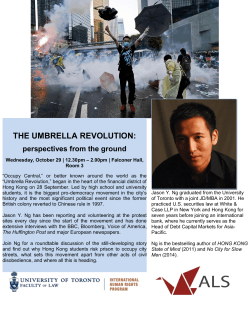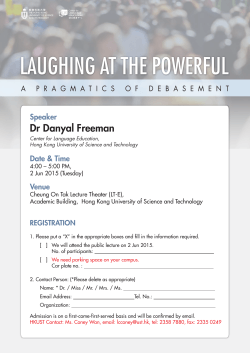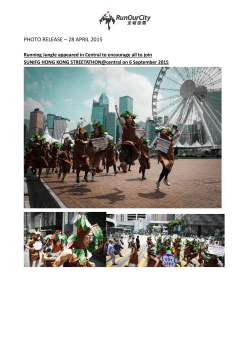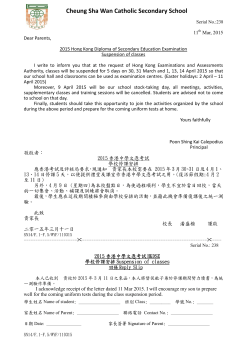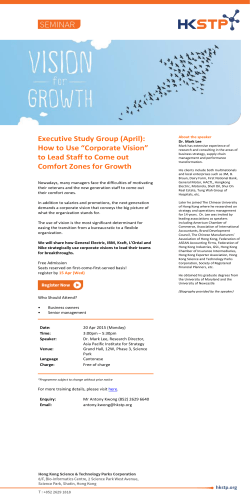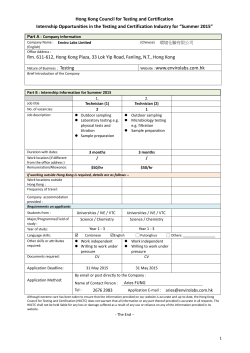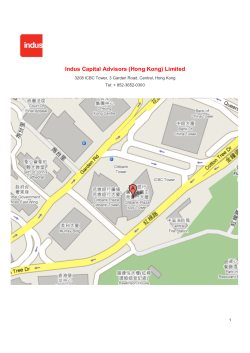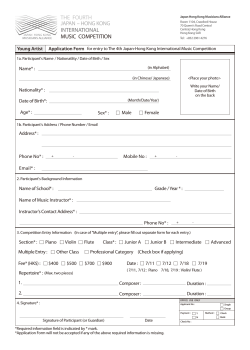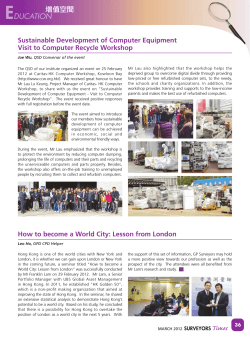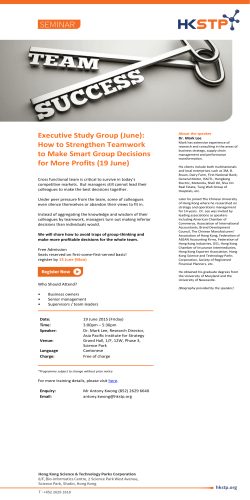
C I T I E S
SAVILLS WORLD RESEARCH 2015 W: www.savills.com/techcities TECH C I T I E S 6 Hong Kong – Asia’s entrepreneurial tech city FIG. 1: Hong Kong at a glance, composite rankings Overall rank Tech environment Business environment Quality of life Talent pool Real estate costs 10 1 6 9 9 12 Categories are weighted Source: Savills World Research H ong Kong has to feature as one of the Asian ‘tech powerhouses’ – supported by all the infrastructure of a world city and with a growing digital economy which has become a significant part of the city’s overall economy. But Hong Kong enjoys mixed status in our range of measures for a successful tech city. Hong Kong’s strengths lie in its tech environment: the physical infrastructure of the digital economy. Broadband is high-speed and cheap and technical IT skills are plentiful (around 80,000 inhabitants were employed in this sector during 2012 according to the HKTDC – a figure since enlarged). Although Hong Kong’s population as a whole is not as involved in the digital world as inhabitants of other cities, whose tech engagement (measured by uploads, edits, listings and tech events) is greater, Hong Kong does rank number one overall for its ‘Tech environment’ (see fig. 1). The other strength of Hong Kong is its ‘Business environment’ low corporate tax rates (16.5%) and speed of setting up a business for start-ups is just three days. The city’s strong financial sector and access to capital also helps, but it needs more specialised venture capitalists to be truly tech-friendly. Above: Hong Kong is one o Asia’s most important centres for tech and ranks in our global top 12. W: www.savills.com/techcities Tech Cities 6 “Hong Kong has the potential to continue competing as a global tech centre – provided it can continue to attract a young, digitally savvy workforce to its shores.” FIG. 2: Live/work cost per employee, per year (USD) FIG. 3: Tech Cities: overall rankings $90,000 1 AUSTIN 7 SINGAPORE 2 SAN FRANCISCO 8 DUBLIN 3 TEL AVIV 9 BERLIN 4 NEW YORK 10 HONG KONG 5 STOCKHOLM 11 SEOUL 6 LONDON 12 MUMBAI $80,000 $70,000 $60,000 $50,000 $40,000 $30,000 $20,000 $10,000 $- Source: Savills World Research When it comes to the regulatory environment and physical infrastructure Hong Kong’s governance system has done a lot to encourage the digital economy in the city. Why then does the city only come 10th of Savills’ Tech Cities overall ranking? (see fig. 3) The areas where Hong Kong underperforms, relative to its global competitors, is in the ‘Talent pool’ measures. It’s major drawback is demographic as Hong Kong has a particularly low ‘millennial-to-boomer ratio’ (that is, it has a smaller number of young people to older). Thanks to its immigration policies, Hong Kong has the capability to attract overseas human capital to its shores, remedying some of this local deficit, particularly in the creative tech field. Its tech education levels are above average globally but only average among the other Savills’ Tech Cities. Like most of the cities, English is widely spoken as a first or second language so Hong Kong has the potential to continue competing as a global tech centre – provided it can continue to attract a young, digitally savvy workforce to its shores. Hong Kong’s ability to attract this workforce is most severely impaired by its performance on ‘Quality of life’ measures, particularly when it comes to pollution, commute times or, more specifically, transport modes – the city is not easy to cycle in. We measured the average ‘tech commute’ in Hong Kong at 41 minutes, compared to 31 minutes across our other twelve tech cities as a whole. Hong Kong does not score particularly high on ‘city buzz’ and ‘kaffeekultur’ with a notably impoverished nightlife compared to our other tech cities like San Francisco and Berlin. It is notable that the hub of creative tech in Hong Kong is Sheung Wan with its fine-grain streets, cafes and restaurants, but our most revealing ‘Flat white index’ shows that the hipsters beverage of choice is among the more expensive, least available and less popular in Hong Kong of the twelve cities studied. “Low taxes are a draw for tech entrepreneurs and developers, but somewhat counterbalanced by Hong Kong’s high cost of real estate.” While low taxes are undoubtedly a draw for tech entrepreneurs and developers, this is somewhat counterbalanced by the very high costs of real estate, especially residential property, in the city. Although office costs are not the highest on a per square foot basis, Hong Kong costs the most to accommodate a typical group of workers in a tech start-up and a tech scale-up company. (see fig. 2) With lifestyle a major consideration in the footloose and global world of the tech entrepreneur, this may prove to be a major challenge for Hong Kong. Other world cities like London and New York are very strong attractors indeed of tech talent – by virtue, among other things, of their world-class cultural, entertainment, arts and social scenes. It is the overwhelming strength of these attractions which counterbalance the high real estate costs of these cities for people wanting to live in them. SAVILLS WORLD RESEARCH 2015
© Copyright 2026
